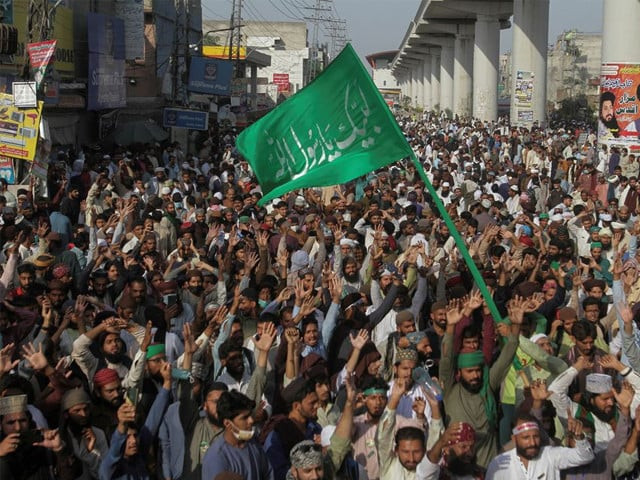Pakistan has been home to violent extremism for quite some time now. However, the recent surge in blasphemy-related incidents has highlighted the gravity of the situation in which the country now finds itself. The frequency of these incidents has increased exponentially, with blasphemy-related incidents reported every now and then.
Violent extremist bands, spurred on by the belief that whoever disrespects their highly revered personalities should be exterminated, run amok and hack anyone to death who has abused those sacred personalities even before unearthing the evidence regarding whether the accused person is even guilty.
On February 11, 2023, an angry mob stormed a police station in Nankana Sahib, in Pakistan’s most populous province of Punjab, where a person accused of blasphemy had taken refuge. It was reported afterwards, unfortunately, that the accused person, Waris Issa, was brutally lynched to death and set on fire by the violent mob as a result of the police’s failure to quell the mob in time and rescue the victim. While such incidents are not new in Pakistan, the recent rise in violent extremism in the country is alarming and symbolic of the state’s failure in keeping the society peaceful.
In 2021, a Sri Lankan citizen, Priyantha Kumar, working as a factory manager in Pakistan’s Sialkot city was lynched and his was body burned by an angry mob in a cold-blooded manner. As happens in almost all such cases, the unfortunate victim was accused of blasphemy, however, without any evidence to that effect.
In addition to this, seminaries in the country have contributed their part fully to the problem by teaching extremist doctrines to their students with a specific focus on terming anybody infidel whose religious beliefs are slightly different from their own. Many ills have been bred by such institutions. Apart from the seminaries, universities and colleges also have radical students who lose sanity when they hear something different from their held religious beliefs. In 2017, Mashal Khan, an undergraduate student of Mass Communication at Abdul Wali Khan University in Mardan, was mercilessly lynched by his university mates who had accused him of blasphemy. The blasphemy charge, however, failed to be backed by any evidence.
Moreover, what is extremely frightening now is that the blasphemy charge is used as a coercion tool for silencing one’s opponents. This way, its malicious use further constricts the already limited landscape for religious freedom in the country. A video emerged of late on social media features a Christian female official of the Civil Aviation Authority (CAA) being threatened with a blasphemy charge by her male colleague when she denied his car entry into the cargo area of the Karachi airport. It was discovered that the reason why she wouldn’t let the car enter was because it did not have a number plate and letting the car through would be a breach of security and protocol. Here it has been proven again that the blasphemy charge can be used for personal vendetta. If this continues, who knows who will become the next victim.
While the aforementioned incidents span a period of time, they are all inspired by the same irrational beliefs and have the same extremist theme; it has nothing to do with Islam as a religion.
Sadly, in Pakistan, the extremist elements are multiplying rapidly with the society and the government is helpless in the face of the growing peril. Surprisingly, many blasphemy-related incidents have occurred even while the law enforcement agencies have kept watch – an example of the authorities’ sheer inability to deal with the problem. If the current trend continues, the situation will deteriorate further, and the incidents would recur more persistently. Perhaps the situation might completely slip out of control.
The current state of extremism in Pakistan has come upon the country in a gradual and systematic manner. Many governmental policies through the years have abetted the extremist elements in carrying on with their violent activities with greater impunity. These policies or legislations include the controversial anti-blasphemy laws among others. Such controversial laws have indirectly empowered the zealots in axing anyone to death on the pretext of blasphemy even when there isn’t the slightest evidence of blasphemy present. Not once has the state taken a harsh approach against the killers to set an example that would deter the fanatics from indulging in such violent undertakings any further. This, therefore, implicates the country’s political leaders and the governing bodies as well in the meteoric rise in violent extremism.
Conclusively, to curb the growing menace of violent extremism in the country, the state with all its institutions must fully rise to the occasion. Stricter measures need to be implemented and de-radicalisation campaigns must be conducted countrywide by the government. Besides this, the citizens should also individually endeavour to lower the intensity in violent extremism. Only when a collective approach is applied will the problem disappear.
The case of growing violent extremism in Pakistan
The current state of extremism in Pakistan has come upon the country in a gradual and systematic manner.

Supporters of the banned Islamist political party TLP chant slogans during a protest rally in Lahore, Pakistan October 22, 2021. PHOTO: REUTERS


COMMENTS
Comments are moderated and generally will be posted if they are on-topic and not abusive.
For more information, please see our Comments FAQ